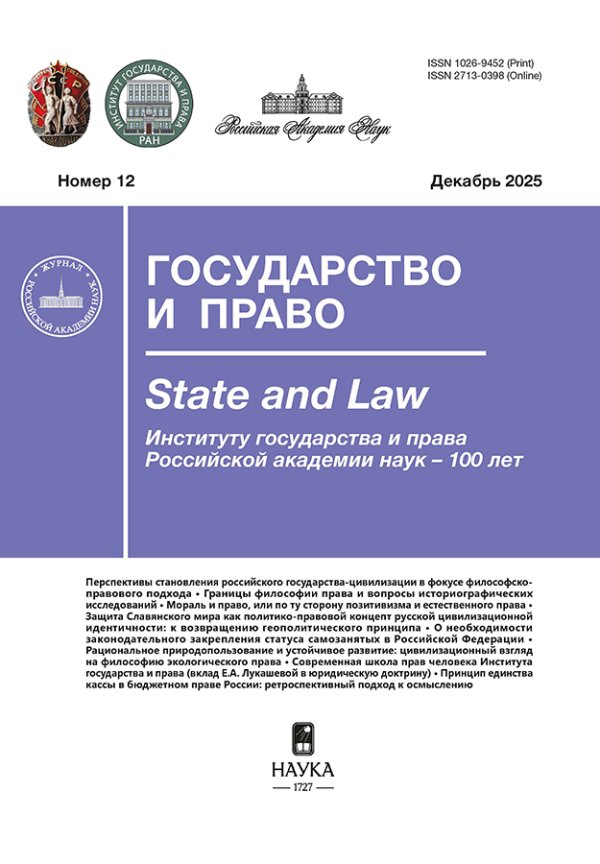Эпистемологические аспекты правоприменения
- Авторы: Чукин Д.С.1
-
Учреждения:
- Саратовский военный ордена Жукова Краснознаменный институт войск национальной гвардии Российской Федерации
- Выпуск: № 10 (2023)
- Страницы: 161-166
- Раздел: Научные сообщения
- URL: https://journals.rcsi.science/1026-9452/article/view/251058
- DOI: https://doi.org/10.31857/S102694520027047-2
- ID: 251058
Цитировать
Полный текст
Аннотация
Ключевые слова
Об авторах
Дмитрий Сергеевич Чукин
Саратовский военный ордена Жукова Краснознаменный институт войск национальной гвардии Российской ФедерацииРоссийская Федерация, Саратов
Список литературы
- Аристотель. Никомахова этика // Аристотель. Собр. соч.: в 4 т. М., 1983. Т. 4. С. 176 - 179.
- Афонасин Е. Аристотель. О движении животных // ΣΧΟΛΗ: античная философия и классическая традиция. 2016. Vol. 10 (2). С. 745, 756.
- Бочкарев С.А. Гносеология уголовного права. М., 2021. С. 197, 218.
- Бочкарев С.А. Философия и её урок для современного правоведения // Государство и право. 2021. № 4. С. 67.
- Девятко И.Ф. Логические и содержательные трудности рационального объяснения действия [Электронный ресурс]. Режим доступа: URL: https://www.studmed.ru/devyatko-if-logicheskie-i-soderzhatelnye-trudnosti-racionalnogo-obyasneniya-deystviya_051e395d3a0.html (дата обращения: 25.07.2023).
- Деланда М. Новая философия общества. Теория ассамбляжей и социальная сложность / пер. с англ. HylePress, 2018.
- Кант И. Собр. соч.: в 6 т. М., 1966. Т. 5. С. 108.
- Латур Б. Пересборка социального: введение в акторно-сетевую теорию / пер. с англ. И. Полонской. М., 2020.
- Лекторский В.А. Глобальная цифровизация как экзистенциальный вызов // Человек в глобальном мире: риски и перспективы / отв. ред. Г.Л. Белкина; ред.-сост. М.И. Фролова. М., 2021. С. 20–31.
- Лундмарк Т. Очерки сравнительного правоведения / науч. ред., сост., предисл. С.А. Бочкарева; пер. Е.Ю. Тихонравов. СПб., 2022. С. 395, 396.
- Правоприменение: теория и практика / отв. ред. Ю.А. Тихомиров. М., 2008. С. 71.
- Савенков А.Н. Философия права и глобальный кризис современности. СПб., 2019. С. 10.
- Степин В.С. Современные цивилизационные кризисы и проблема новых стратегий развития. М., 2018.
- Фома Аквинский. Сумма против язычников. Книга вторая / пер. и прим. Т.Ю. Бородай. М., 2004. С. 217, 223.
- Хабермас Ю. Моральное сознание и коммуникативное действие / пер. с нем. С.В. Шaчинa; под ред. Д.В. Скляднева; послесл. Б.В. Маркова. М., 2000.
- Энциклопедия эпистемологии и философии науки. М., 2009. С. 246.
- Юм Д. Трактат о человеческой природе // Юм Д. Соч.: в 2 т. М., 1996. Т. 1. С. 458.
- DeLanda M. Philosophy and simulation: The emergence of synthetic reason. L., 2011.
- Emergence: Contemporary Readings in Science and Philosophy / eds. M. Bedau and P. Humphreys. Cambridge, 2008.
- Welsch W. Transkulturalitat. Zwischen Globalisierung und Partikularisierung. In: Interkulturalitat – Grundprobleme der Kulturbegegnung, Mainzer Universitatsgesprache Sommersemester. Mainz, 1998.
Дополнительные файлы










